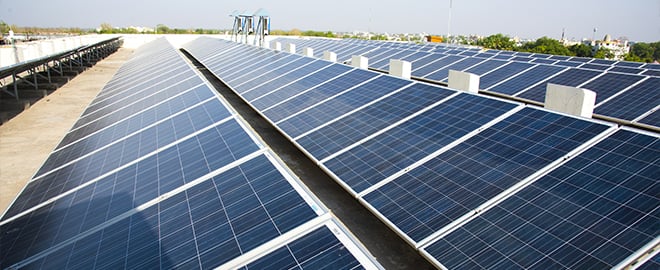Energy Procurement | September 7, 2022
Impact of the Inflation Reduction Act on Energy Procurement
Today, we’re taking a deep dive into the impact of the Inflation Reduction Act on energy procurement for small to medium businesses. In August 2022, President Biden signed the Inflation Reduction Act of 2022 into law. Its main goal was to strip social spending provisions while retaining climate, energy, and healthcare provisions at modest levels. However, it also included fiscal incentives for small businesses.
Within the legislation, small and medium-sized business owners will encounter provisions impacting their health care plans, electric vehicles, and tax credits. However, the most noteworthy is that of clean energy.
Stay tuned to learn how the Inflation Reduction Act might be affecting you and your current energy plan.
What is the Inflation Reduction Act?
For those not already familiar with the Inflation Reduction Act, the recent legislation was conceived by the Biden administration and congressional democrats in the hopes of reshaping the American economy, growing it from the bottom up and middle out. Democratic supporters claim that the bill will reduce the deficit by over $300 billion and the provisions have been estimated by some to raise $737 billion over the next decade.
Impact on Small Business Energy Procurement
One of the largest ways the Inflation Reduction Act impacts small and medium businesses is via energy procurement. Through tax credits and deductions, as well as assistance with low-cost solar power, the legislation is fairly straightforward in fighting for clean energy and increased sustainability.
Clean Energy Tax Credits
The Inflation Reduction Act offers $60 billion for clean energy manufacturing and $30 billion in production tax credits for wind and solar, as well as credits for nuclear and carbon capture technologies. The administration hopes that such measures will expand clean energy efforts and reduce carbon emissions in the U.S.
If small business owners have not already done so, we recommend beginning the shift to cleaner energy procurement, as the tax credits make doing so now easier than ever. Of course, business owners will also need to protect themselves and their businesses from future taxation and fees.
Note: Businesses that continue to produce excess methane emissions from oil and gas drilling should expect increased fees as a result of this legislation.
Assistance Switching to Low-Cost Solar Power

Clean energy tax credits isn’t the only implication for small and medium-sized business owners. The legislation will also aid businesses’ transition to low-cost solar power by offering a tax credit that covers 30 percent of the cost.
For business owners, switching to solar power has never been more financially feasible. It is also a tremendous way to lower operative costs and protect against volatile energy prices that are currently seizing small businesses.
Tax Deductions for Making Energy Efficient Upgrades
Under the Inflation Reduction Act, small and medium-sized corporations can deduct up to $1.00 per square foot of their business for making high-energy efficiency upgrades. Additionally, the deduction per square foot is increased if said upgrades are made by well-paid employees.
Therefore, small and medium-sized business owners can save money by upgrading to energy-efficient technologies (and they will save even more by offering their workforce prevailing wages).
Tax Credits on Electric Vehicles
This legislation offers consumers a tax credit of up to $7,500 for buying a new or used electric vehicle (which is extended through December 2023). While both individuals and businesses are already rapidly turning to electric vehicles for long-term savings, this tax credit will help subsidize the transition.
Under the Inflation Reduction Act, business owners can receive a tax credit of up to $40,000 for their electric commercial vehicles weighing over 14,000 pounds. Not only that, but the benefits of commercial elective vehicles are more lenient and potentially greater than their consumer counterparts.
Additional Impacts of the Inflation Reduction Act on Small Businesses
While the impact of the Inflation Reduction Act on energy procurement for small to medium businesses is grand, it doesn’t end there. As a comprehensive piece of legislation, the act also affects small business tax credits and potential business opportunities.
Elevated Business Opportunities
As we mentioned, the Inflation Reduction Act incentivizes individuals to make energy-efficient upgrades to their homes and properties. Oftentimes, when homeowners make those changes, they enlist the help of small and medium-sized businesses.
Therefore, local business owners should see a demand for their products and services as a result of this legislation. This is especially true for companies that provide green energy or environmentally-friendly equipment.
Extended Research and Development Tax Credit
The Research and Development (R&D) tax credit gives businesses of all sizes an opportunity to reduce their owed taxes in accordance with expenses they have incurred to develop new products. Previously, the amount owed was found using a complex formula allowing for up to $250,000 against payroll taxes. However, after the passing of the Inflation Reduction Act, this limit has been increased to $500,000.
Final Thoughts
Are you a small or medium-sized business owner? We hope that today’s article was able to shed some light on the impact of the Inflation Reduction Act on Energy Procurement for Small to Medium Businesses.
If you would like to take advantage of some of the Inflation Reduction Act’s benefits for businesses, our team at Mantis Innovation can help. As your trusted partner, we promise to deliver smart, sustainable solutions to reimagine your facility’s performance.
Contact our team to learn more about what we can do for you
Related Posts
Discover more content and insights from Mantis Innovation

The Cost of Inaction: Why Businesses Should Act Now on Energy Efficiency
In today's fast-paced business environment, the financial and operational losses businesses incur by delaying energy efficiency improvements, the "cost of inaction," is more relevant than ever.

In today’s AI era, human intelligence is the key to data center facility and energy optimization
Nowhere else in modern industry do artificial and human intelligence converge with such transformative potential as in the world of data centers. As AI's extraordinary growth accelerates demand for

Power Shift: Energy Insights Post-Election
A new president has been elected, and while conversations are swirling about tariffs and drawbacks in sustainability initiatives, it is important to understand what effects the administration change

Navigating Energy Procurement: Strategies to Manage Risk
When procuring energy for your commercial business, it can be difficult to weigh the risks associated with buying strategies. How do you know your procurement strategy is the right one? How